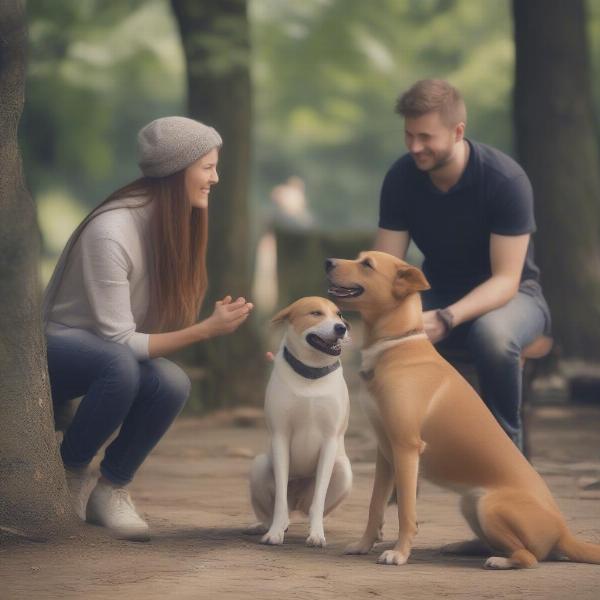Reactive dog behavior can be challenging for both the dog and owner. It often manifests as barking, lunging, or growling in response to perceived threats or triggers. Understanding the root causes of reactivity and finding the right reactive dog class is crucial to helping your dog overcome these behaviors and live a more balanced life. This article will guide you through the process of finding a suitable class, understanding what to expect, and provide valuable tips for managing your reactive dog.
What to Look for in a Reactive Dog Class
Choosing the right reactive dog class is essential for your dog’s progress. A good class will focus on positive reinforcement methods, creating a safe and controlled environment for dogs to learn and desensitize to their triggers. Look for classes that:
- Emphasize positive reinforcement: Avoid classes that use punishment-based techniques, as these can worsen reactivity. Positive reinforcement methods, such as rewarding calm behavior and using high-value treats, are much more effective.
- Offer small class sizes: Smaller classes allow for more individualized attention from the trainer and create a less overwhelming environment for reactive dogs.
- Have a qualified instructor: A certified professional dog trainer with experience in reactivity is crucial. Look for certifications from reputable organizations and ask about their experience working with reactive dogs.
- Provide a structured curriculum: A well-structured curriculum will address different aspects of reactivity, including desensitization, counter-conditioning, and management techniques.
- Prioritize safety: A safe and controlled environment is essential for reactive dog classes. Look for classes that utilize safe distances between dogs and have clear safety protocols in place.
Preparing Your Dog for a Reactive Dog Class
Before starting a reactive dog class, there are a few things you can do to prepare your dog for a positive experience:
- Practice basic obedience: A solid foundation in basic obedience commands, such as “sit,” “stay,” and “come,” will be helpful in managing your dog’s behavior during class.
- Get your dog used to the training equipment: If the class requires specific equipment, such as a harness or muzzle, introduce it to your dog gradually and in a positive way.
- Manage expectations: Understand that progress takes time and patience. Celebrate small victories and don’t get discouraged if your dog doesn’t show immediate improvement.
What to Expect During a Reactive Dog Class
Reactive dog classes typically involve a combination of classroom sessions and practical exercises. During class, you can expect to learn about:
- Identifying triggers: Understanding what triggers your dog’s reactivity is the first step towards managing it.
- Desensitization and counter-conditioning: These techniques help your dog gradually become less reactive to their triggers by associating them with positive experiences.
- Management techniques: Learning how to manage your dog’s environment and avoid triggers is crucial for preventing reactive episodes.
- Body language and communication: Understanding canine body language will help you anticipate and respond to your dog’s reactivity more effectively.
Long-Term Management of Reactivity
Managing a reactive dog is an ongoing process that extends beyond the classroom. Consistency and patience are key to long-term success. Remember to:
- Continue practicing the techniques learned in class: Regular practice is essential for maintaining progress and reinforcing positive behaviors.
- Avoid triggers as much as possible: While desensitization and counter-conditioning are important, managing your dog’s environment and avoiding triggers is equally crucial.
- Seek professional guidance when needed: Don’t hesitate to reach out to your trainer or a veterinary behaviorist for additional support if you encounter challenges.
Conclusion
A reactive dog class can be a valuable resource for owners of reactive dogs. By choosing the right class and committing to consistent training and management, you can help your dog overcome their reactivity and live a happier, more balanced life. Finding a supportive community of trainers and other reactive dog owners can also provide valuable encouragement and guidance throughout the journey. Remember, patience and consistency are key to achieving lasting results.
 Reactive Dog Success Story
Reactive Dog Success Story
FAQs
- How long does a reactive dog class typically last? Most reactive dog classes run for 6-8 weeks.
- Can puppies attend reactive dog classes? Yes, some classes cater specifically to reactive puppies.
- Is it ever too late to start training a reactive dog? No, it’s never too late to start training.
- What if my dog is too reactive to attend a group class? Private training sessions may be a better option in this case.
- How do I find a reputable reactive dog class near me? Ask your veterinarian for recommendations or search online for certified professional dog trainers specializing in reactivity.
- What are some common triggers for reactive dogs? Common triggers include other dogs, strangers, loud noises, and unfamiliar environments.
- How can I tell if my dog is truly reactive or just overly excited? A reactive dog’s behavior stems from fear or anxiety, while an excited dog’s behavior is typically more playful and less intense.
benicia dog park
dog friendly winery
braunston secure dog walking field
dog walkers oakville ontario
ILM Dog is a leading international dog website dedicated to providing expert advice on all aspects of dog care and training. From breed selection to health and wellness, nutrition, and behavior, we offer a wealth of information to help dog owners provide the best possible care for their furry companions. Our team of experts specializes in a wide range of dog-related topics, including dog training, and nutrition, offering valuable insights and resources for dog owners of all experience levels. For expert advice and personalized guidance, contact us at [email protected] or +44 20-3965-8624. Visit ILM Dog for more information.